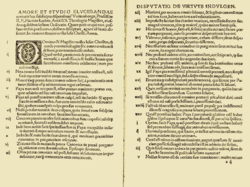| Part of a series on the |
| Reformation |
|---|
 |
| Protestantism |
The Reformation in Ireland was a movement for the reform of religious life and institutions that was introduced into Ireland by the English administration at the behest of King Henry VIII of England. His desire for an annulment of his marriage was known as the King's Great Matter. Ultimately Pope Clement VII refused the petition; consequently, in order to give legal effect to his wishes, it became necessary for the King to assert his lordship over the Catholic Church in his realm. In passing the Acts of Supremacy in 1534, the English Parliament confirmed the King's supremacy over the Church in the Kingdom of England. This challenge to Papal supremacy resulted in a breach with the Catholic Church. By 1541, the Irish Parliament had agreed to the change in status of the country from that of a Lordship to that of Kingdom of Ireland.
Unlike similar movements for religious reform on the continent of Europe, the various phases of the English Reformation as it developed in Ireland were largely driven by changes in government policy, to which public opinion in England gradually accommodated itself. In Ireland, however, the government's policy was not embraced by public opinion; the majority of the population continued to adhere to Catholicism.
